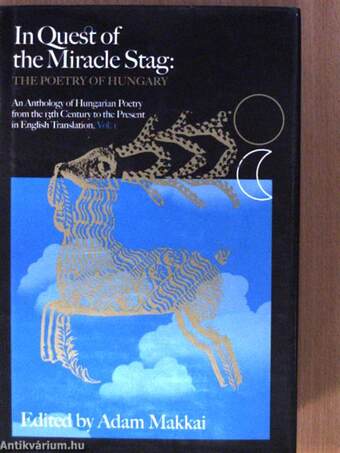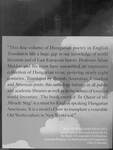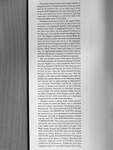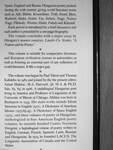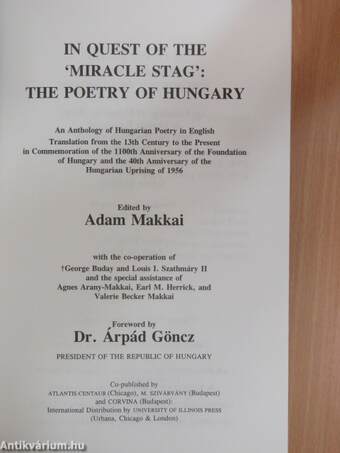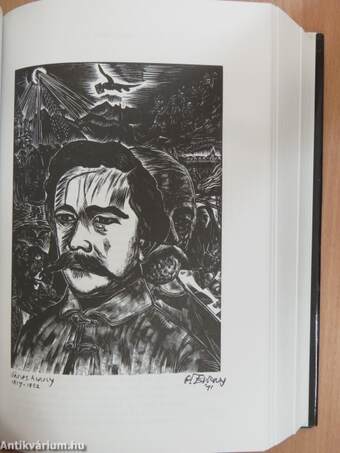1.066.445
kiadvánnyal nyújtjuk Magyarország legnagyobb antikvár könyv-kínálatát

VISSZA
A TETEJÉRE
JAVASLATOKÉszre-
vételek
In Quest of the 'Miracle Stag': The Poetry of Hungary
An Anthology of Hungarian Poetry in English Translation from the 13th Century to the Present in Commemoration of the 1100th Anniversary of the Foundation of Hungary and the 40th Anniversary of the Hungarian Uprising of 1956
| Kiadó: | Atlantis-Centaur-M. Szivárvány-Corvina |
|---|---|
| Kiadás helye: | Chicago-Budapest |
| Kiadás éve: | |
| Kötés típusa: | Fűzött keménykötés |
| Oldalszám: | 964 oldal |
| Sorozatcím: | An Anthology of Hungarian Poetry in English Translation |
| Kötetszám: | 1 |
| Nyelv: | Angol |
| Méret: | 23 cm x 16 cm |
| ISBN: | 0-9642094-0-3 |
| Megjegyzés: | Néhány fekete-fehér reprodukcióval. További kapcsolódó személyek a kötetben. |
naponta értesítjük a beérkező friss
kiadványokról
naponta értesítjük a beérkező friss
kiadványokról
Előszó
TovábbFülszöveg
This fine volume of Hungarian poetry in English
Translation fills a huge gap in our knowledge of world
literature and of East European history. Professor Adam
Makkai and his team have assembled an impressive
collection of Hungarian verse, covering nearly eight
centuries. Translated by British, Australian, Canadian
and American poets, this anthology belongs in all public
and academic libraries as well as in the homes of lovers of
world literature. The book entitled In Quest of the
Miracle Stag is a must for English speaking Hungarian
Americans. It is a model of how to transplant a venerable
Old World culture in New World soil."
ident, International Society for
the Study of Comparative Civilizations,
Emeritus Professor of Anthropology and Linguistics,
Drew University.
The present volume contains almost eight eenmries of
Hungarian poetry in English translation, from 1230 to the
present. It celebrates the 1,100th anniversary of the
presence of the Hungarians in... Tovább
Fülszöveg
This fine volume of Hungarian poetry in English
Translation fills a huge gap in our knowledge of world
literature and of East European history. Professor Adam
Makkai and his team have assembled an impressive
collection of Hungarian verse, covering nearly eight
centuries. Translated by British, Australian, Canadian
and American poets, this anthology belongs in all public
and academic libraries as well as in the homes of lovers of
world literature. The book entitled In Quest of the
Miracle Stag is a must for English speaking Hungarian
Americans. It is a model of how to transplant a venerable
Old World culture in New World soil."
ident, International Society for
the Study of Comparative Civilizations,
Emeritus Professor of Anthropology and Linguistics,
Drew University.
The present volume contains almost eight eenmries of
Hungarian poetry in English translation, from 1230 to the
present. It celebrates the 1,100th anniversary of the
presence of the Hungarians in Europe (896-1996) as well
as the 40th anniversary of the Hungarian Uprising
(1956-1996), which brought an end to the myth of the
unconquerability of the Soviet Union.
Hungarian poetry has its roots in the magical chants
and incantations of a nomadic people practicing
shamanism. The original Hungarians, anthropologically
related to the Uigurs of Xingkiang Province in China,
left Asia in two waves—the first appeared in Europe as
the Huns (400 A.D.) and the second as the Magyars (896
A.D.) The Magyars' migration route past the Black Sea
brought them into contact with Turkic and Iranic peoples
many of whose loanwords survive in the language;
ultimately, however, Hungarian became a modern Finno-
Ugric language related to Finnish and Estonian in
Europe, Mansi, Khanti (Vogul and Ostyak) in Central
Asia. An agglutinating language with complex patterns
of rhymes and rhythms, Hungarian is a linguistic island in
the midst of Slavic, Germanic and Romance languages.
After one hundred years of raids against Byzantium
and Western Europe, the Hungarians became Christians
when St. Stephen (1000-1038) accepted the Holy Crown
from Pope Sylvester II. By the time of the Tartar invasion
of 1242, Hungary had become the shield of Western
Europe. In 1526, when the Turks attacked Europe,
Hungary stood in their way for 150 years. After the
expulsion of the Turks in 1686, Hungary came under the
political and cultural influence of the Habsburg Empire
and Germany with two failed attempts at independence
(1711 and 1848.) World Wars I and II saw a reluctant
Hungary in alliance with Germany. In 1920, when the
Austro-Hungarian Monarchy was dissolved, Hungary
lost two thirds of her former territories. Today there are
ten million Hungarians within Hungary and five million
without. Of the world's more than 5,000 languages
Hungarian is forty-seventh in sizes of speakers.
Hungary's poetry is among of the world's greatest,
both in terms of content and diction, and as a historical
mirror of a nation's consciousness. Translating it can be a
daunting task. The volume starts with FOLK POETRY
and continues with MEDIEVAL POETRY, showing
the transition from Asian shamanism to Latin-inspired
Christianity. The birth of Hungarian literature coincides
with the AGE OF THE REFORMATION and the
TURKISH WARS. Three great poets stand out in the
15th and the 16th century, Janus Pannonius who wrote in
Latin, Miklós Zrínyi, and Bálint Balassi, an equal of Sir
Philip Sydney, Ronsard and DuBellay. The 18th century
starts with KURUC POETRY; these were the freedom
fighters of Prince Rákóczi (1701-11). The 18TH
CENTURY and the ENLIGHTENMENT produced
major poets in the figures of Kölcsey, Berzsenyi and
Csokonai, while the 19TH CENTURY'S classical
triumvirate of Vörösmarty, Petőfi and Arany put
Hungarian poetry on a par with Germany, France, Italy,
Spain, England and Russia. Hungarian poetry peaked
during the 20th century giving world literature poets
such as Ady; Babits, Kosztolányl Tóth, Jó/sel Illyés,
Radnóti, Sinka, Szabó, Vas, Juhász, Afagy, Nemes
Nagy,, Pilinszky,; Weóres, Határ,; Faludy and Kányádi.
Each period is introduced by a brief discussion and
each author is preceded by a one-page biography.
The volume concludes with a major essay by
Hungary's master essayist, László Cs. Szabó, "A
Nation and its Poetry."
*
This volume is suitable for comparative literature
and European civilization courses in universities as
well as forming an essential part of any collection of
world literature. It fills a major gap.
*
The volume was begun by Paul Tabori and Thomas
Kabdebo in 1963 and joined by the the present editor,
Adam Makkai, (B.A. Harvard, 58, M.A. & Ph.D.
Yale, '63, '65) in 1966. A multilingual Hungarian poet
living in America and Professor of Linguistics at the
University of Illinois at Chicago, Makkai was born in
Budapest in 1935. His main works include Idiom
Structure in English (1972), A Dictionary of American
Idioms (1975-85-95), A Dictionary of Space English
(1973), and three volumes of poetry in Hungarian.
Anthologized in four American English poetry
volumes, he recently finished Cantio Nocturna
Peregrini, a heptalingual volume of poetry written in
English, German, French, Spanish, Latin, Russian
and Hungarian. In 1974 he founded LACUS, The
Linguistic Association of Canada and the United
States. Vissza
Témakörök
- Szépirodalom > Versek, eposzok > Versantológia
- Idegennyelv > Idegennyelvű könyvek > Angol > Szépirodalom > Versek, eposzok > Versantológia
- Idegennyelv > Idegennyelvű könyvek > Angol > Irodalomtörténet
- Irodalomtörténet > Irodalomelmélet > Műfordítás
- Szépirodalom > Versek, eposzok > A szerző származása szerint > Európa > Magyarország
Megvásárolható példányok
Nincs megvásárolható példány
A könyv összes megrendelhető példánya elfogyott. Ha kívánja, előjegyezheti a könyvet, és amint a könyv egy újabb példánya elérhető lesz, értesítjük.



